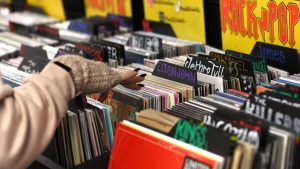US music publishing revenue jumped 10.7% to $6.2bn in 2023… outstripping recorded music’s growth in percentage terms

The US music publishing industry is facing a new challenge in the form of Spotify’s unexpected reduction to its mechanical royalty payouts. But despite this and other challenges, the songwriting and music publishing business remains strong.
That’s the verdict from David Israelite, President and CEO of the National Music Publishers’ Association, which on Wednesday (June 12) revealed US music publishing revenues for 2023.
Revenues for the year came in at $6.21 billion, up 10.74% from the year before, Israelite told the audience at the NMPA’s annual meeting.

“We’re living in a turbulent time in the music industry, but despite the many challenges we’re facing, I am pleased to report to you that the state of the songwriting and music publishing industry is strong,” Israelite said.
The 10.74% YoY growth rate – representing an increase of about $600 million in raw dollar terms – is little more than half the increase seen the year before, when US music publishing saw a 19.25% YoY increase, or growth of around $900 million.
That giant increase in 2022 was attributed to a number of factors, not least of which was the reopening of many venues as the Covid-19 pandemic receded, which spiked publishers’ royalties from bars, clubs, restaurants, stores, etc.
Publishers also benefited from a Copyright Royalty Board (CRB) decision to increase the mechanical royalty rate paid to publishers by music streaming services for the 2018-2022, which resulted in a boost to owners of song copyrights.
Notably, the increase in music publishing revenue, in percentage terms, was stronger by about half compared to growth in recorded music revenues.
The revenue data reported by the NMPA is wholesale data (i.e. trade revenues reported by its members), so a like-for-like comparison would mean looking at wholesale, and not retail, revenues in recorded music – that is, the amount of money that ends up in the pockets of distributors, record labels, and artists, as opposed to the retail figures, which reflect the money paid by consumers to streaming services, record stores, etc.
According to the Recording Industry Association of America (RIAA), US recorded music wholesale revenues came in at $11 billion in 2023, an increase of 7% YoY.
In raw dollar terms, wholesale US recorded music revenues increased by around $700 million YoY, versus an increase of around $600 million in music publishing revenues – a strong showing for the publishing side, given that the scale of revenue in recorded music is around double that of publishing.


In 2023, publishing revenues couldn’t count on tailwinds as large as those seen in 2022, but they did still benefit from the ongoing increase in paying music subscribers (see, for instance, the 15% YoY increase in Spotify’s paid subscriptions in 2023).
Additionally, publishing revenues benefitted from price hikes at many of the major music streaming services, including at Spotify, Apple Music, Amazon Music, and YouTube Music.
In many cases, this was the first time these streaming services had raised their prices – though, judging by Spotify’s second price hike in the US in less than a year, they’re unlikely to be the last, a fact that portends well for 2024 revenues.
Overall, US music publishing revenues have seen a significant run-up over the last decade, with 2023 nearly tripling the revenue recorded in 2014, and nearly doubling the number seen in 2018.

However, one large uncertainty now hangs over US music publishing revenue going forward: Spotify’s decision to reclassify its Premium music subscription tiers as “bundled” services, now that those tiers include 15 hours of audiobook time per month.
According to the CRB’s rules, streaming services can pay out a lower rate from bundled services than from standalone music subscriptions, and Israelite estimates that this will cost songwriters $150 million in lost revenue over the next year, “and even more in the future.”
The issue is one that the NMPA is taking so seriously that it occupied the lion’s share of Israelite’s presentation at the annual meeting.
“This year were going to do something different, and focus on a singular issue: The war launched by Spotify against songwriters.”
David Israelite, NMPA
“Based on a flawed interpretation of the law, without notice or consent, Spotify converted all 44 million [US] subscribers into bundled subscribers,” the NMPA boss told the audience.
“Spotify now claimed that almost half the revenue paid by these subscribers was no longer for music. They claimed that almost half the revenue was now going to audiobooks, a feature that had been given away for free, a feature that did not increase the price of the subscription, a feature that we suspect most subscribers have never used.”
Israelite revealed during the presentation that the NMPA had filed a formal complaint with Federal Trade Commission over “alleged unlawful conduct by Spotify,” which the NMPA claims “is harming millions of consumers and the music marketplace.”
“Spotify has deceived consumers by converting millions of its subscribers without their consent from music-only subscriptions into ‘bundled’ audiobook-and-music subscriptions, publicly announcing increased prices for those subscriptions, failing to offer an option for subscribers to revert to a music-only subscription, and thwarting attempts to cancel through dark patterns and confusing website interfaces,” the NMPA’s complaint states.
That’s just one of a number of moves that the NMPA and other groups representing publishers have taken since Spotify notified rights holders in March of its changes to mechanical royalty payouts.
The Mechanical Licensing Collective (The MLC) has sued Spotify over the move, arguing that the Spotify’s new “bundle” doesn’t actually qualify as a bundle under US copyright rules, because the addition of 15 hours of audiobook time doesn’t add “more than token value” to the subscription plans.
The NMPA also sent a warning to Spotify, alleging that the streaming service is offering users unlicensed lyrics, as well as podcasts and videos featuring unlicensed music.
In other words, it’s a full court press against Spotify by the US music publishing business.
“We are facing one of the greatest challenges yet,” Israelite said. “This year were going to do something different, and focus on a singular issue: The war launched by Spotify against songwriters.”Music Business Worldwide





